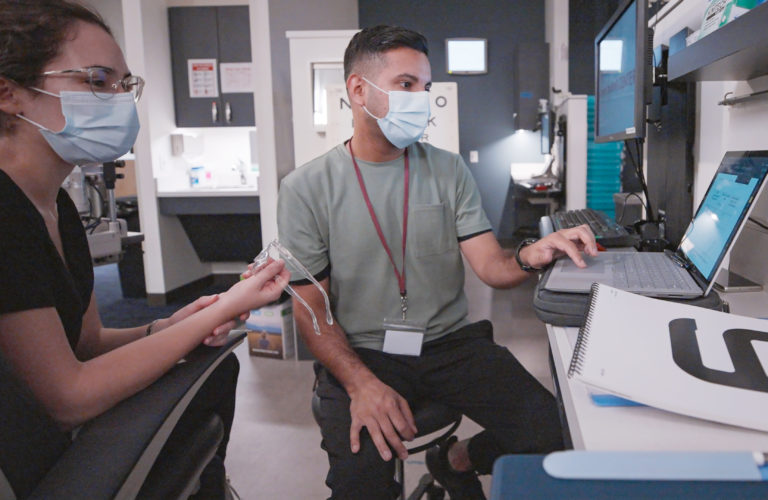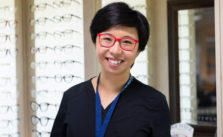
Clinical Program
Our optometrists-in-training gain skills through hands-on experiences in a variety of settings, including comprehensive vision centers, hospitals, community health centers, private practices, and VA medical centers.
By transforming what traditionally was a micro focus on the eye into a macro view of the health of the whole patient, NECO works to ensure that students gain mastery in fundamental skills but also in the critical thinking needed to competently diagnose, prescribe, and treat any type of optical patient or condition they encounter.
Clinical training and coursework are delivered concurrently, so that students can see firsthand the very conditions they are learning about and put into practice the techniques they’re studying in the classroom.

Quintessentially NECO
“Community-based clinical training is quintessentially NECO. It defines us by what we believe in. And we believe firmly in providing vital eye care in community health centers as part of a patient’s overall health care. And in providing excellent, unique, in-depth clinical training to students at the same time. Everyone wins.”
— Dr. Howard Purcell, OD, NECO President and CEO
Clinical Education: 4-year OD program
NECO’s clinical education program is mapped to closely integrate courses, skills labs, and clinical experiences so that what you learn in the classroom is immediately put to use. The Office of Clinical Education monitors the quality and quantity of patient encounters for each student.
This early immersion into clinical care allows students to:
- Apply clinical skills,
- Integrate academic knowledge with clinical experience, and
- Learn communication techniques.
Your initial encounters are with toddlers, children, and young adults. Later on in the first year, you may have the opportunity to participate in screenings designed for older populations. You perform visual acuities, entrance testing, and refraction.
An integral part of your clinical education is learning to communicate effectively with patients. Communication skills are taught in the seminar classes and assigned readings: you can hone your own style of communication as you gain patient care experience.
The observation program will place you in different health settings to critically observe how communication techniques are utilized by practicing clinicians.
In your second year of clinic at NECO, you begin to take responsibility for the clinical care of patients under the guidance of clinical preceptors.
Coursework in year 2 also aligns tightly with the skills labs and clinical rotations. Students learn to:
- Apply primary care clinical skills learned in the classroom,
- Develop an awareness of cultural and socioeconomic issues that impact patient care, and
- Cultivate patient communication and problem-solving skills through observation of health care professionals and/or staff.
In year 2, you begin working with a clinical preceptor who will guide you through the initial part of the eye exam. You may work on clinical techniques such as case history, entrance testing, refractions, prescribing, and slit lamp evaluation.
As the year progresses, you may also incorporate tonometry, gonioscopy, and dilated fundus assessment.
By the end of the year, you should be comfortable with performing at least the first half of a comprehensive eye exam in an efficient manner.
In the third year of clinical education at New England College of Optometry, students continue to take on more responsibility for the clinical care of patients.
Clinical assignment locations during the third year include comprehensive eye centers, community clinics, community health centers, group practices, hospitals, and VA hospitals.
During the year, students:
- Apply the primary care clinical skills and ancillary testing skills necessary in performing a complete eye exam, and
- Integrate theoretical knowledge, analytical skills, and clinical skills to develop a differential diagnosis for and to manage a wide array of visual problems, effectively communicate with patients, and coordinate with other healthcare professionals to ensure the delivery of high quality eye care.
Throughout the course of the year, students gain efficiency as they independently collect and analyze data necessary to manage the visual needs of their patients.
Externships are completed for the 4-year and accelerated programs. There are four clinical rotations over 12 months.
Here, you take responsibility for the clinical care of patients from start to finish, including coordination of follow-up care, writing referral letters, and providing patient education under the supervision of clinical preceptors. You will rotate through four types of clinical assignments:
- Community Health Center
- VA Hospital
- Specialty care (vision therapy, pediatrics, specialty contact lens, low vision)
- Elective (private optometry practices, additional VA opportunities, hospital-based clinics, ophthalmology practices)
Some students may be assigned to contact-lens-specific sites in order to assure a broad clinical experience.
NECO offers OD4 students a vast number of sites that are diverse in patient base and location. Student assignments are based on a variety of factors, including student choices and program needs.
Choices are available in the Boston region, nationally in over 30 states, as well as China, Canada, and the United Kingdom.
Community Health Centers
- Greater Boston area
Veterans Affairs Medical Centers
- Multiple locations in 10+ states
Specialty Care
- NECO special populations rotation in academic medical centers and specialty clinics at locations such as Perkins School for the Blind
- Vision therapy
- Pediatrics
- Specialty contact lens
Electives
- Academic medical centers
- Army Health Clinic
- Canadian eye clinics
- Additional community health centers across the U.S.
- MD/OD group practices involving cornea, cataract, retina, glaucoma, and refractive surgeries
- Naval Health Clinics
- Private optometry practices
- Veterans Affairs Medical Centers

Variety of Externships
Externships provide opportunities to learn various practice models, different targeted populations, and dive into specialty areas.
NECO Clinical News
-

Medical Science Liaison
From student to director, one alumna's journey
-

Competency + Compassion
Cultural competency and compassion at core of training
-

CARE Study
Researching the Advancement in Assistive Technology